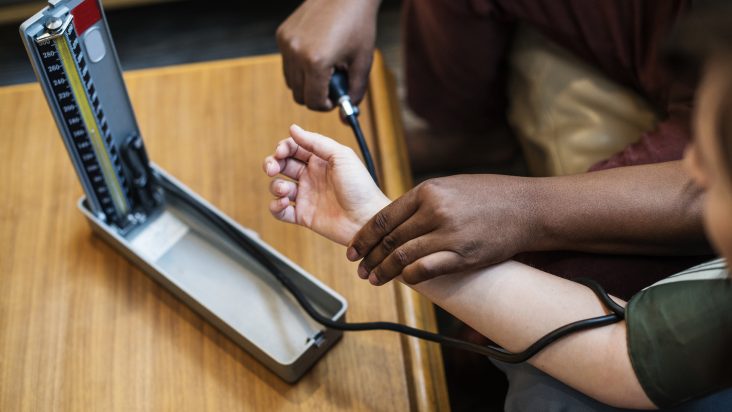When most people hear the word “hypertension,” they think of stressed-out adults. But high blood pressure in children is becoming more common—and in many cases, it goes unnoticed.
In the UAE, where rates of childhood obesity are among the highest in the region, pediatric hypertension is no longer rare. The condition can quietly affect your child’s heart, kidneys, and overall development before any symptoms appear.
At KidsHeart, we encourage families in Dubai, Abu Dhabi, and Al Ain to get ahead of this silent threat. In this blog, we’ll cover what hypertension looks like in children, what puts them at risk, and how you can take action early to protect your child’s health.
What Is Pediatric Hypertension?
Hypertension is when the blood pressure—the force of blood pushing against the walls of the arteries—is consistently too high. In children, “normal” blood pressure varies based on age, gender, and height, so diagnosing it is more complex than it is in adults.
We use specialized charts and tools to determine if your child’s readings are too high. If they are, your child may be diagnosed with:
- Elevated blood pressure
- Stage 1 hypertension
- Stage 2 hypertension (more severe)
Our Pediatric Cardiology team regularly monitors blood pressure in children with cardiac risk factors or family history concerns.
Why It’s a Growing Concern in the UAE
Several factors are contributing to the rise in pediatric hypertension in the UAE:
- High childhood obesity rates (over 30% in some regions)
- Diets high in salt, processed foods, and sugary drinks
- Sedentary lifestyles with increased screen time
- Genetic predisposition, especially in families with early-onset hypertension
- Environmental stressors, including exam pressure and sleep deprivation
And because many children don’t show symptoms, the condition can go undiagnosed for years—leading to long-term heart strain, artery damage, or kidney issues.
Warning Signs to Watch For
Most children with high blood pressure feel completely fine. That’s what makes it so tricky.
However, in some cases, subtle signs may include:
- Frequent headaches, especially in the morning
- Nosebleeds without an obvious cause
- Fatigue or poor focus in school
- Blurred vision
- Chest pain or shortness of breath during activity
- Dizziness or fainting episodes
These symptoms don’t always mean high blood pressure, but if they persist, it’s important to have them checked out—especially if your child is overweight or has a family history of hypertension.
Who Is Most at Risk?
Your child may be more likely to develop hypertension if they:
- Have a high body mass index (BMI)
- Eat a high-salt or high-fat diet
- Don’t get regular physical activity
- Were born premature or with low birth weight
- Have a congenital heart or kidney condition
- Have parents or siblings with hypertension
- Experience chronic stress or poor sleep habits
For these children, regular blood pressure screening is essential—and something we include in all comprehensive heart evaluations.
How We Detect and Monitor Hypertension at KidsHeart
At KidsHeart, blood pressure monitoring is part of every cardiology and general pediatric checkup. If elevated readings are found, we follow up with:
- Repeat blood pressure checks in a calm, rested state
- 24-hour ambulatory blood pressure monitoring (ABPM) for accuracy
- ECG and echocardiogram to check the heart
- Kidney function tests, when needed
We also assess lifestyle, diet, sleep, and stress levels—because treating hypertension is rarely just about medication. It’s about whole-child health.
What You Can Do as a Parent
If your child is at risk or already diagnosed, here’s how you can help:
- Encourage a Heart-Healthy Diet
- Choose fresh fruits, vegetables, whole grains, and lean proteins
- Cut back on salty snacks, fast food, and sugary drinks
- Involve your child in shopping and meal prep for better buy-in
- Promote Regular Physical Activity
- Aim for at least 60 minutes of activity per day
- Walking, swimming, biking, dancing—all count
- Limit screen time and encourage outdoor play
- Prioritize Sleep and Stress Management
- Children need 9–12 hours of sleep, depending on age
- Avoid screens before bed and create calming routines
- Address school stress or anxiety with open communication or professional support if needed
- Follow Up with Your Pediatrician or Cardiologist
- Regular blood pressure checks are key
- Follow any medication or monitoring plans as prescribed
- Ask about nutritional or psychological support if needed
We also work closely with our in-house Pediatric Psychology and Nutrition teams to provide integrated care when lifestyle changes feel challenging.
Final Thoughts for UAE Families
Hypertension doesn’t have to wait for adulthood. It’s showing up earlier in children—and often without warning. But the good news is: it’s manageable and often reversible with the right awareness and action.
Whether your child is showing symptoms, has risk factors, or you simply want a thorough health check, our team is here to support you with clear, compassionate care.
at our clinics in Abu Dhabi, Dubai, or Al Ain—and take a proactive step toward lifelong heart wellness.

